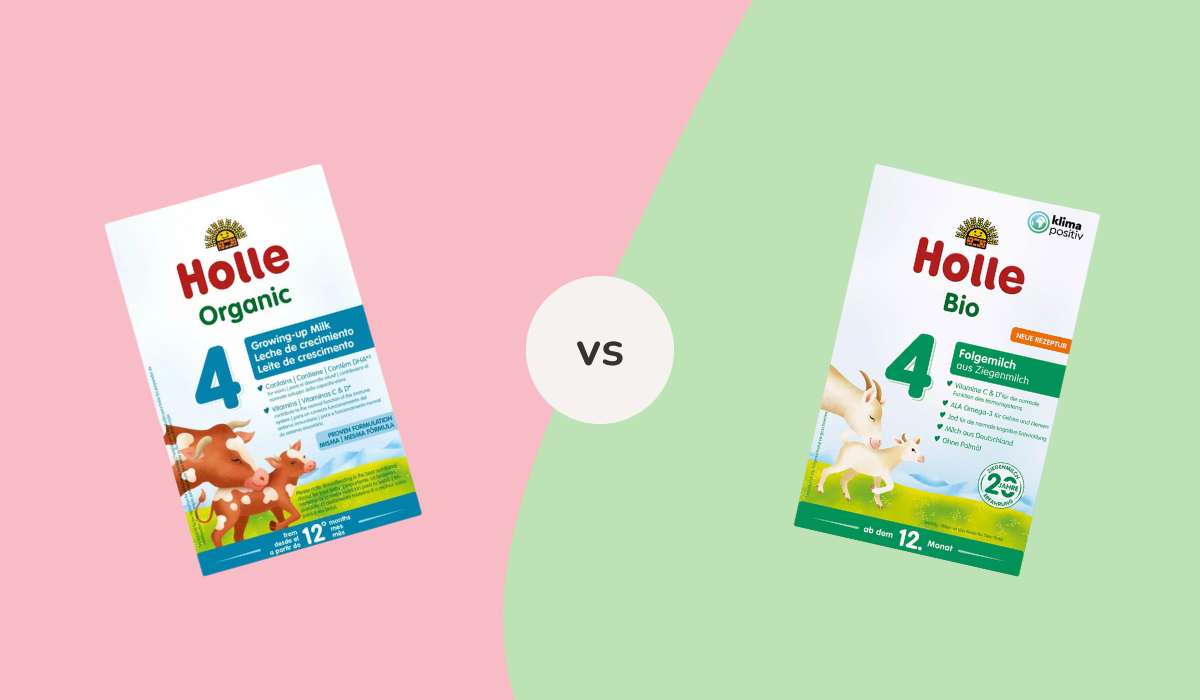Holle organic infant formula uses gentle, carefully selected natural ingredients and stays away from GMOs and artificial additives, making it a popular choice amongst health-conscious parents. Additionally, each Holle formula is packed with essential nutrients, vitamins, and minerals to nourish your little one throughout their development.
While Holle as a brand is highly regarded for their impressively crafted formula, there is still great debate as to whether cow's or goat's milk is the better option. Today's guide will cover the differences and similarities of these two formula types to help you understand the differences between Holle Cow vs Goat. We will also look at their nutritional benefits and potential drawbacks to help you make the best choice for your little one!
What Sets Goat Milk Formulas Apart from Cow's Milk Formulas?
When comparing goat milk and cow milk baby formulas, it's important to remember that one isn't necessarily better than the other. All infant formulas are strictly regulated and must contain the same essential nutrients regardless of their milk type.
That being said, one of these formula types might be better for your child due to their specific needs. That's why it's useful to understand the factors that set goat's milk and cow's milk formulas apart. Here, we will compare goat and cow's milk generally based on 4 criteria, beginning with protein composition:
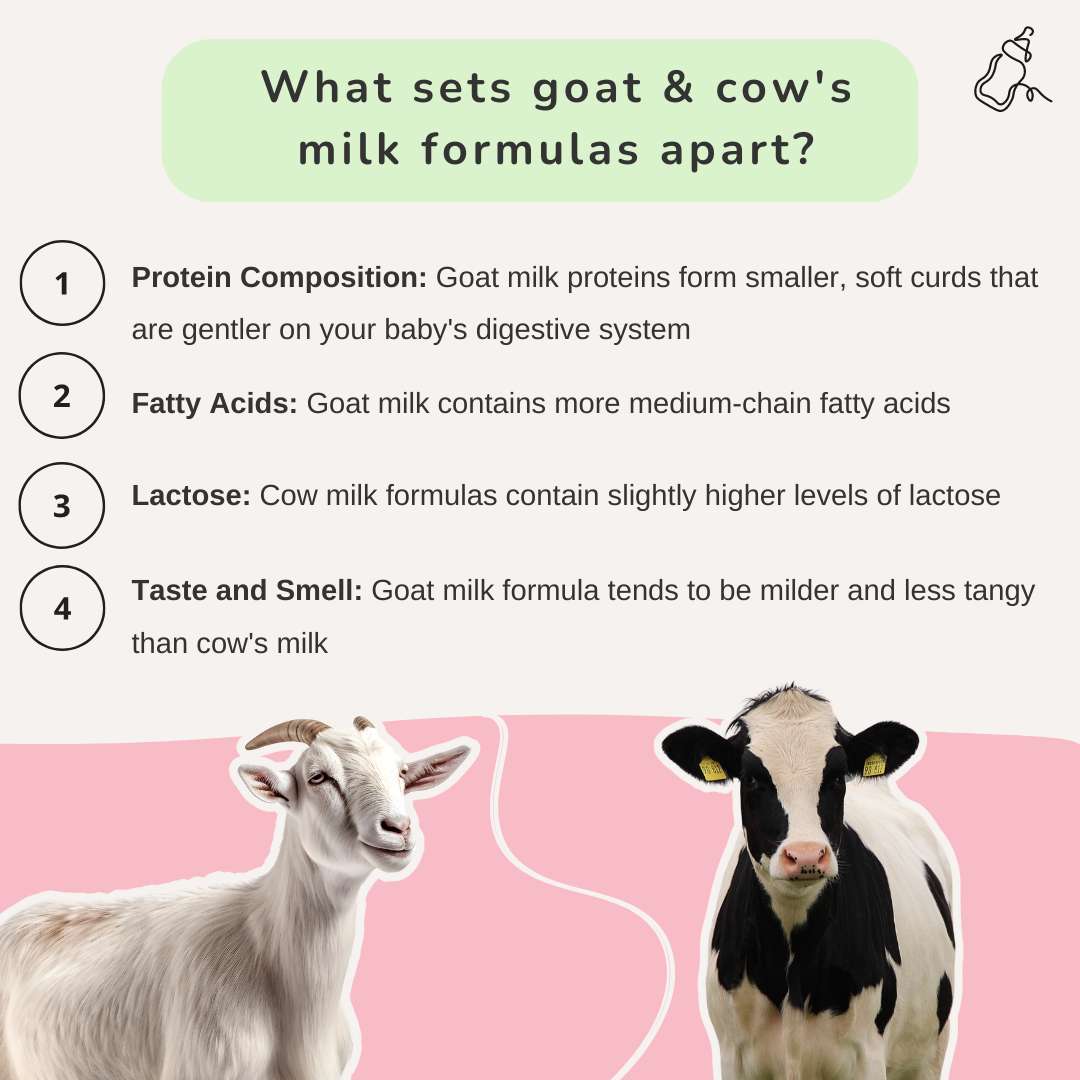
1. Protein Composition
Generally, goat milk-based formulas are easier to digest because goat milk proteins form smaller, soft curds that are gentler on your baby's digestive system. Cow milk contains proteins that tend to form larger, firmer curds. That's why this milk type can be harder to digest, especially for babies with sensitive tummies.
2. Fatty Acids
Goat milk contains more medium-chain fatty acids, which are believed to be more easily absorbed (making goat milk a good option if your baby's stomach is sensitive). Cow's milk, however, has a higher proportion of long-chain fatty acids. This could make cow's milk formulas less optimal for sensitive digestive systems.
3. Lactose
Cow milk formulas contain slightly higher levels of lactose. This means goat milk formula can be a better option for babies who are lactose-sensitive, but it is not a suitable alternative for lactose-intolerant infants.
4. Taste and Smell
Goat milk formula tends to have a more distinct flavor. Some believe that it's milder and less tangy than cow's milk, and others feel it has a stronger overall taste. The difference in smell and taste comes down to one's personal preferences. Some babies tolerate both cow and goat formulas easily, and others need time to adjust when switching from one to the other.
Holle Goat Milk vs Cow Milk: Differences
Now that we understand some of the differences between goat's and cow's milk in a general sense, let's explore the differences between Holle products specifically!
1. Differences in Milk
First of all, Holle Cow uses skim milk and partially demineralized whey powder. Holle Goat, however, contains whole goat's milk without adding the whey powder. An advantage of Holle Goat is that it has no need to use palm oil to mimic the natural fatty acid profile of breast milk - whole milk does this naturally, thanks to its high palmitic acid content!
2. Differences in Digestive Ease
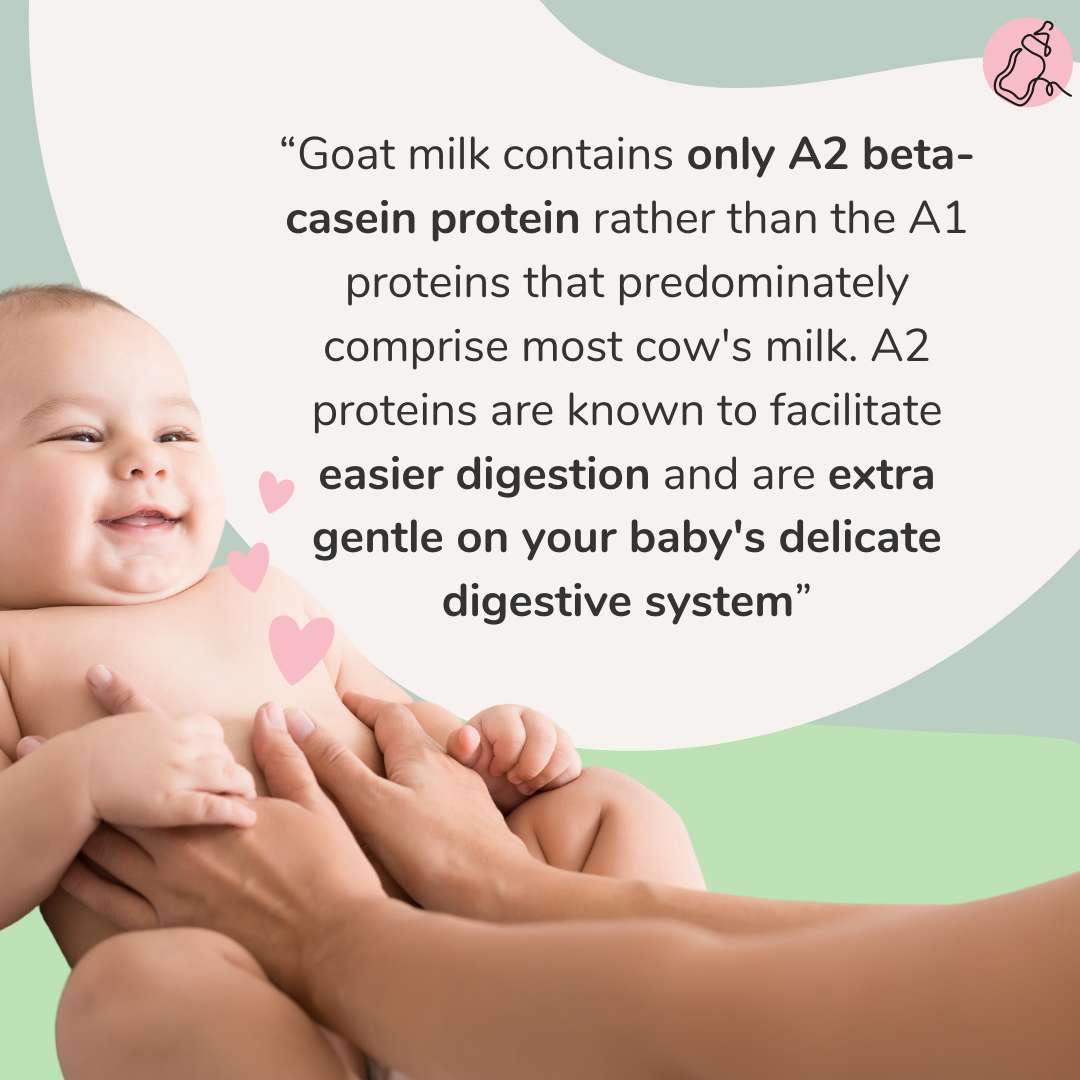
Goat milk contains only A2 beta-casein protein rather than the A1 proteins that predominately comprise most cow's milk. A2 proteins are known to facilitate easier digestion and are extra gentle on your baby's delicate digestive system.
Excitingly, Holle makes a special line of A2 cow's milk formula from cows that naturally produce only the A2 type of milk for babies that prefer that taste of cow's milk but require a gentler feeding option.
Despite their differences in proteins, both goat and cow formulas can cause an allergic reaction if your baby has a cow's milk protein allergy (CMPA). That being said, if your baby is simply sensitive to cow's milk, Holle Goat might be tolerated just fine. Ultimately, it's best to consult your pediatrician to determine to right fit for your baby.
3. Difference in Taste
Luckily, both Holle cow's milk formula and goat milk formula are typically well-tolerated by infants. Holle Goat, in particular, is described as having a naturally creamy flavor that many babies love.
Holle Goat Milk vs Cow Milk: Similarities
Carbohydrates: Both cow and goat options from Holle use lactose only as the main carb in Stages PRE and 1. However, from Stage 2 onwards, Holle also adds starch and maltodextrin for an additional supply of energy and to create a creamier texture that helps older babies feel full for longer.
Omega-3 Fatty Acid (DHA): Both Holle formulas extract DHA (essential fatty acids) from algae oil. Thus, they don't contain fish oil. This helps eliminate the potential of a fishy flavour and is a more environmentally friendly choice. As far as other micronutrients go, Holle's cow and goat milk baby formula contains the same minerals and vitamins.
Organic Certification: All Holle formulas are certified European organic. That means that the formula brand doesn't allow genetically modified organisms, artificial flavors, synthetic components, or added sugars.
To top that off, Holle Cow and Goat Stages PRE to 3 are also Demeter-certified biodynamic. This means these infant formulas are produced based on regenerative farming principles according to the strictest organic standards globally. However, Holle Cow A2 milk and Stage 4 formulas are only EU organic as they do not qualify for the Demeter certification.
Holle Cow
Holle Cow contains organic, quality ingredients. This formula uses skimmed cow milk as a base and contains essential fatty acids docosahexaenoic acid (DHA) and alpha-linolenic acid (ALA). Thus, Holle Cow offers a rich but simple composition, making it a great formula for your baby and their healthy development.
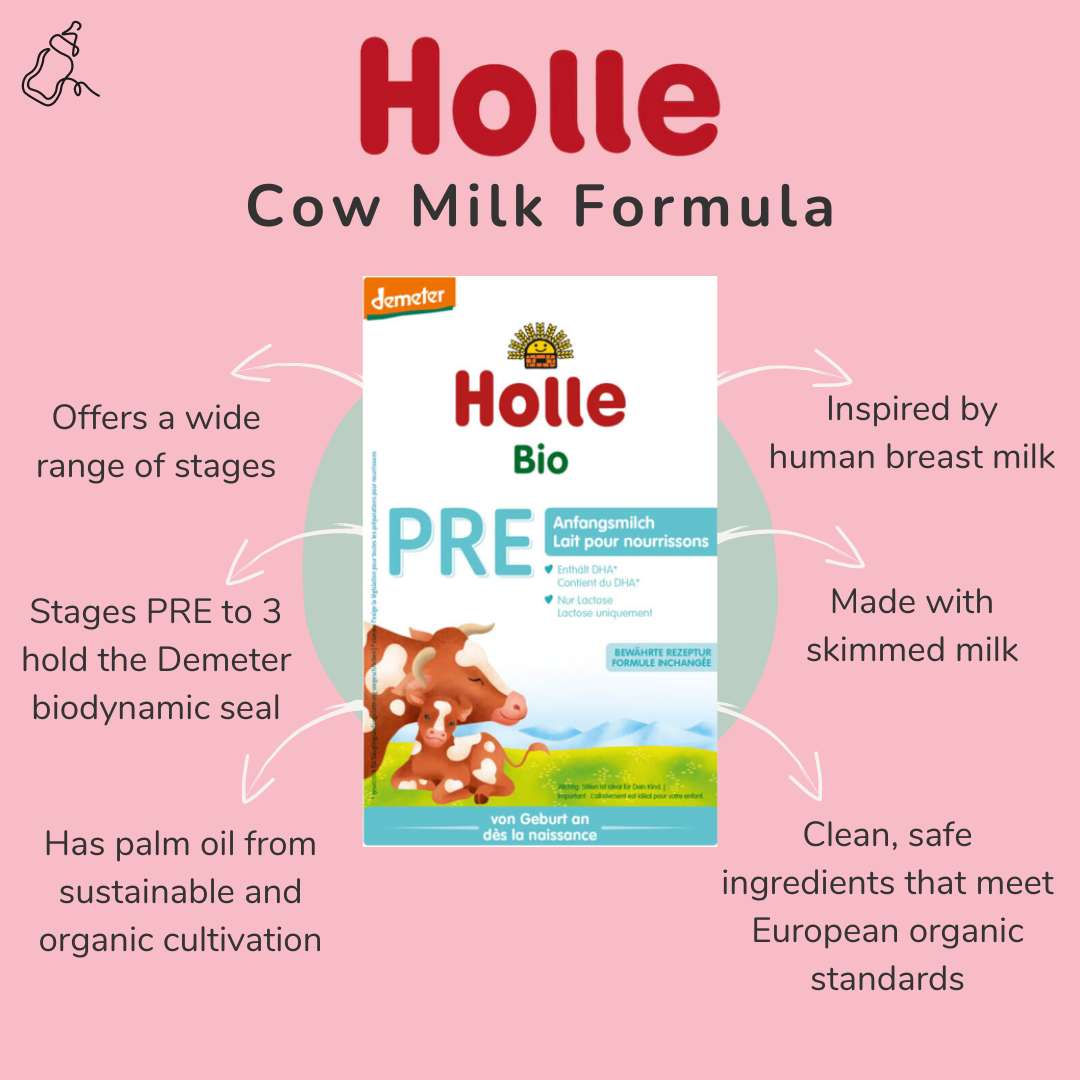
Holle cow milk formula is available in 5 stages:
-
Holle Cow Stage PRE (0 to 6 months)
-
Holle Cow Stage 1 (0 to 6 months)
-
Holle Cow Stage 2 (6+ months)
-
Holle Cow Stage 3 (10+ months)
-
Holle Cow Stage 4 (12+ months)
Benefits of Holle Cow's Milk Formula ➕
-
Clean, safe ingredients that meet European organic standards
-
Stages PRE to 3 hold the Demeter biodynamic seal, which means this formula is regulated by supplementary strict standards
-
Uses gently processed milk to preserve its nutritional value, making Holle Cow closer to human breast milk
-
Offers a wide range of stages
Drawbacks of Holle Cow's Milk Formula ➖
-
Not suitable for babies with lactose intolerance or cow's milk protein allergy
-
Uses skimmed milk, which creates the need for vegetable oil fats
-
Has palm oil from sustainable and organic cultivation
Holle A2 Cow
If your baby is sensitive to cow milk proteins (not allergic or lactose intolerant), there is also Holle A2 to try. It contains gentler milk proteins that are easier to process and puts less stress on your baby's digestion.
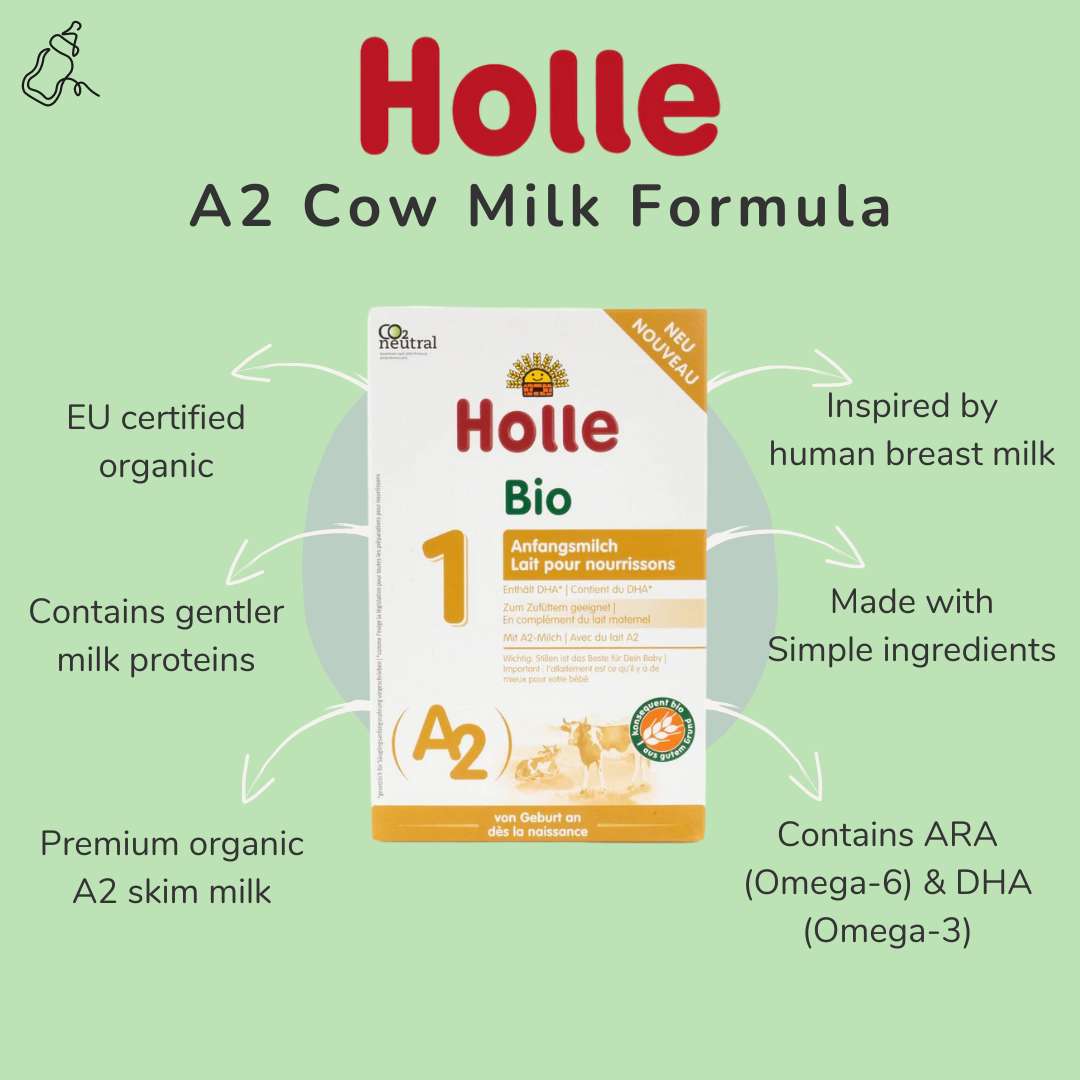
Holle cow milk formula is available in 3 stages:
-
Holle A2 Cow Stage 1 (0 to 6 months)
-
Holle A2 Cow Stage 2 (6+ months)
-
Holle A2 Cow Stage 3 (10+ months)
Holle Goat
Holle Goat is a great choice for parents who want a clean ingredient list. What sets Holle Goat apart is that this formula uses whole goat's milk. Goat milk is naturally easier to digest, making this formula perfect for babies with sensitive tummies. It also offers a lower vegetable oil content thanks to the milk fats present in whole milk.
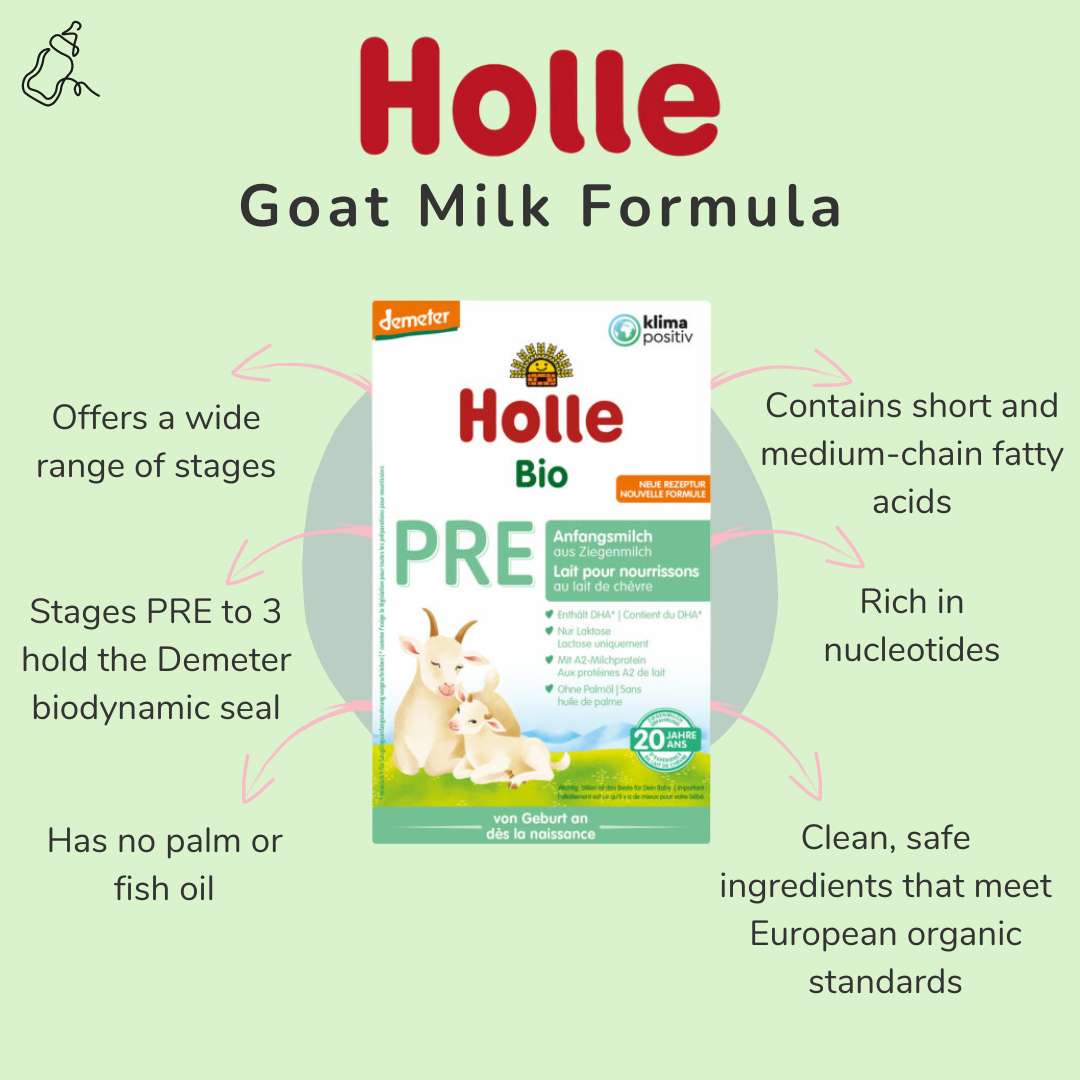
Holle goat milk formula is available in 5 stages:
-
Holle Goat Stage PRE (0 to 6 months)
-
Holle Goat Stage 1 (0 to 6 months)
-
Holle Goat Stage 2 (6+ months)
-
Holle Goat Stage 3 (10+ months)
-
Holle Goat Stage 4 (12+ months)
Benefits of Holle Goat Formula ➕
-
Has no palm or fish oil
-
Stages PRE to 3 hold the Demeter biodynamic seal, which means this formula is regulated by supplementary strict standards
-
The whole milk base allows for less processing of the formula
-
Contains short and medium-chain fatty acids (unlike in cow milk formula), which means they are more easily absorbed
-
Has a naturally high content of palmitic acid, which is essential for healthy development
-
Rich in nucleotides, up to 5x more than what's present in cow's milk formula
Drawbacks of Holle Goat Milk Formula ➖
-
Despite being an excellent alternative to cow milk-based formula, Holle Goat is not suitable for babies with lactose intolerance or cow's milk allergy
How to Switch from Cow Milk Formula to Goat Milk Formula
The first step when switching from cow to goat formula should be consulting a professional. A pediatrician can help make the transition as safe and stress-free as possible.
Another important step you should remember is to make sure you introduce changes slowly and gradually. Keep in mind that organic goat milk formula may have a more distinct flavor than cow's milk, which means your baby might require more time to adjust to the new taste.
It's best to make observations before adding more feedings with the new formula to ensure that your little one isn't experiencing any digestive issues like excessive gas or constipation.
Finally, try to keep the feeding routines and environment consistent to help your little one feel more comfortable and calm in the face of their formula change!
FAQs about Holle cow milk formula and goat milk formula
We hope you've learned enough so far to help to better understand the key differences between Holle Cow and Goat formulas. If you still have a couple of lingering questions, here are answers to some common questions that parents ask:
Which formula is better, cow or goat?
One is not necessarily better than the other. The choice would depend on your baby's needs, health (intolerances or allergies, for example), and your pediatrician's recommendations.
Is goat or cow milk better for baby?
Both cow and goat milk have several benefits for your baby. Goat milk formulas, however, can be digested more easily, though A2 cow's milk is also a good option for babies with sensitive tummies. It's best to choose based on your baby's specific needs and pediatrician recommendations.
Why is Holle not FDA-approved?
The Food and Drug Administration (FDA) only regulates baby formula brands manufactured in the US. Holle, however, is made in Germany, and thus it falls under European regulations.
Wrapping Up: Holle Cow vs Goat
Both Holle cow and Holle goat formulas are a top choice for your baby, especially if you prioritize organic, clean ingredients. However, keep in mind that there are slight differences to be aware of.
For instance, Holle Goat and A2 cow are both better suited to sensitive tummies. That being said, many babies do well on regular Holle cow's milk formula. Additionally, Holle goat is more rich and creamy than their cow's milk options. Lastly, none of the formulas mentioned today are suitable for babies with lactose intolerance or CMPA.
Even if your baby does not have special dietary requirements, remember to consult a pediatrician before making your final choice. Together, you can look at what Holle has to offer to satisfy your baby's specific needs!
Breast milk is the best source of nutrition for babies. Before altering your baby's diet or feeding routine, consult your healthcare provider for personalized recommendations. The information in this article is strictly for informational purposes and is not a substitute for medical advice.


